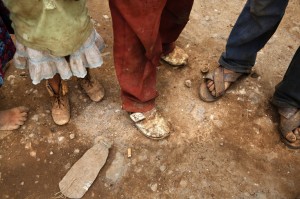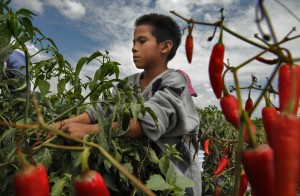
01/02/15 (written by otawka) — The Los Angeles Times recently released an extensive report revealing the poor conditions for thousands of agricultural workers in Mexico, addressing widespread issues of modern day slavery and child labor law violations. The four-part article by Richard Marosi began after several workers escaped from a Bioparques del Occidentefarm back in June 2013, alerting authorities to the harsh living conditions, and in some cases instances of enslavement or forced labor experienced by the workers. The report details findings based on an 18-month investigation of such mega-farms throughout nine Mexican states—farms that are the cornerstone of Mexico’s growing agribusiness whose exports to the United States reached $7.6 billion in the last decade. Corporations like Bioparques and Rene Produce are among those investigated, and also those that sell to the popular U.S. retailers like Walmart, Target, Whole Foods, Albertsons, and Safeway.
Many of the workers that work on these mega-farms are temporary, migrant workers, and mostly come from rural and indigenous communities, often recruited in their hometowns by contractors that work for the companies. The mega-farms, continues the report, tend to be set up similar to work camps with guards and barbwire fencing around the perimeters. Workers earn on average $8 to $12 a day and, although illegal, many camps withhold wages to prevent workers from leaving during the peak of the season when they need workers most. Because of inflated prices at company stores, workers then go into debt purchasing basic goods and food. The workers are often malnourished, with limited to no access to healthcare and live in structures that resemble slave quarters: concrete buildings infested with bed bugs, rodents, or scorpions, and beds made of cardboard or plastic crates.
In the more extreme cases, workers are prohibited from leaving the camps, and face beatings and death threats if they attempt. Such is the case at the Bioparques camp in the San Gabriel region, south of Guadalajara in Jalisco where the several workers had escaped in June 2013. At least one man who unsuccessfully attempted to escape the farm was reportedly tied to a tree and beaten by camp bosses. In total, 275 people were trapped on that farm including 39 children, most of whom were found to be malnourished. Bioparques de Occidente is one of Mexico’s largest tomato exporters and has mega-farms in both Jalisco and Sinaloa. It sells under the “Kaliroy” brand to U.S. retailers including Walmart, Albertsons, and Safeway.
Many of the workers at the Bioparques camp in Jalisco are of Huastec origin, coming from the states of Hidalgo, San Luis Potosí, and Veracruz in the La Huasteca region of Mexico. Upon recruitment, workers were promised wages of $100 pesos (about $8 USD) a day. They were told that their meals would be free, as well as housing and childcare. At first workers were indeed paid $100 pesos a day based on their completed eight hours of work, but then, reports the Los Angeles Times, the management changed to a quota system where they had to fill 60 buckets of tomatoes in order to earn $100 pesos. Often tomatoes were scarcer, making it difficult to meet the quota, which was especially the case for elderly employees, who often then had to rely on loans from co-workers in order to buy goods at the company store.
Each day workers were given a stack of tortillas, and served watery soup for lunch and dinner, and occasionally beans and rice. Marosi reports that many workers went in debt at the company store from purchasing basic necessities. There was an instance of one mother asking her boss for more tortillas for her children, and he told her she would be slapped for asking again. Some workers became ill because of the harsh conditions on the farms, including the exposure to pesticides and were refused medical attention. Workers reported being threatened with physical force to maintain the level of work required by their bosses.

The Los Angeles Times report also found that there was no school, day care, or playground for the dozens of children that lived on the farm. Mothers had to create makeshift cribs out of netting to protect their babies from scorpions. The very young children, and toddlers often remained in the fields or in the greenhouses alongside their parents. Despite the fact that the legal working age in Mexico is 15, many farms in Mexico hire children as long as six years old to pick produce. According to the most recent estimate released by the Mexican government, reports the Los Angeles Times, nearly 100,000 Mexican children under the age of 14 pick crops for pay.
The information on Bioparques came to light on June 11, 2013, after three workers successfully escaped and notified authorities in Guadalajara about the abuses and forced labor. The State Attorney General of Jalisco (Procuraduría General de Justicia del Estado de Jalisco, PGJE) descended on the farm, arresting five people during the raid who were charged with human trafficking. Of those charged, two were Bioparques employees (who were later exonerated by a judge) and the other three were employees of the labor contractor. Bioparques also received $700,000 in penalties for violating health and labor laws, though Bioparques spokeswoman Minerva Gutierrez claims those fines have been dropped when the company met certain health and safety requirements. The State Attorney General has yet to comment on the status of case of the Bioparques camp, and the World Bank has not withdrawn financial support of the corporation. However, some of Bioparques’ retailers have responded, such as Walmart, which stated that it would no longer purchase from that farm. Nevertheless, as Marosi writes, those responsible for the agribusiness human rights violations and deplorable conditions continue to evade justice. “When the mistreatment of the workers at the camp was finally exposed, Mexican authorities made arrests, imposed fines and promised to make an example of the company. A year and a half later, however, the case of Bioparques speaks more to the impunity of Mexican agribusiness than to accountability.”
According to the Walk Free Foundation’s “Global Slavery Index 2014,” there are currently an estimated 266,900 people in modern slavery in Mexico, with the most vulnerable populations being indigenous, migrants, and children. In fact, over half of the 1.2 million people living in slave-like conditions in all of the Americas are found in Mexico, Haiti, and Brazil alone, the organization reports. In comparison, the United States has 60,000 people in modern slavery, while Canada has 4,600. However, in 2014, Mexico did issue its first sentence of child labor exploitation, and approved its National Program for the Prevention, Punishment, and Eradication of Crimes on Trafficking in Persons and the Protection and Assistance to Victims of these offenses 2014-2018, which aims to address issues of modern day slavery in Mexico.
To read the full Los Angeles Times report, click here.
Sources:
Zamaroni, Ulises. “Rescatan a 275 Personas; eran forzadas a trabajar.” El Universal. June 12, 2013.
“The Global Slavery Index: Mexico.” Walk Free Foundation. Last accessed January 1, 2015.




